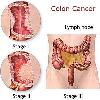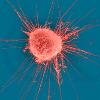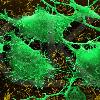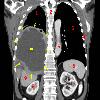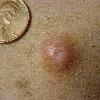

- » New supercharged broccoli to fight off cancer
- » John Goeken, founder of telecom giant MCI, dies at 80 after battle with cancer
- » FDA extends review of Avastin amid debate over its effectiveness for breast cancer patients
- » Ex-Kiss drummer Peter Criss, a survivor of male breast cancer, raising funds through walkathon
- » FDA panel says risks of tumors outweigh benefits of diet pill from Arena Pharmaceuticals
- » Paul Allen says follow-up test for non-Hodgkins Lymphoma came back 'clean'
- » Vergara, Applegate, others help raise research money in 'Stand Up to Cancer' telethon
- » Sandler, Seacrest, Leno help raise research money in 'Stand Up to Cancer' telethon
- » Diane Lane, Marcia Cross join Friday's 'Stand Up To Cancer' telethon on broadcast, cable
- » Pfizer to spend $500,000 over 2 years on research partnership with American Kennel Club
Topics: Health Tags: Cancer View |
Topics: Health Tags: Cancer View |
Topics: Health Tags: Cancer View |
|||||||||
Topics: Health Tags: Cancer View |
Malignant Mesothelioma, coronal CT scan. Tags: Cancer View |
Topics: Health Tags: Cancer View |
|||||||||
Topics: Health Tags: Cancer View |
Cancer (medical term: malignant (malignancy) neoplasm) is a class of diseases in which a group of cells (cell (biology)) display uncontrolled growth (division (cell division) beyond the normal limits), invasion (intrusion on and destruction of adjacent tissues), and sometimes metastasis (spread to other locations in the body via lymph or blood). These three malignant properties of cancers differentiate them from benign tumors, which are self-limited, and do not invade or metastasize. Most cancers form a tumor but some, like leukemia, do not. The branch of medicine concerned with the study, diagnosis, treatment, and prevention of cancer is oncology.
Cancer may affect people at all ages, even fetuses, but the risk for most varieties increases with age. Cancer causes about 13% of all human deaths (causes of death). According to the American Cancer Society, 7.6 million people died from cancer in the world during 2007. Cancers can affect all animals.
Nearly all cancers are caused by abnormalities in the genetic material (genome) of the transformed (malignant transformation) cells. These abnormalities may be due to the effects of carcinogens, such as tobacco smoke, radiation (electromagnetic radiation), chemicals, or infectious agents (pathogen). Other cancer-promoting genetic abnormalities may be randomly acquired through errors in DNA replication, or are inherited (genetic disorder), and thus present in all cells from birth. The heritability of cancers is usually affected by complex interactions between carcinogens and the hosts genome. New aspects of the genetics of cancer pathogenesis, such as DNA methylation, and microRNAs are increasingly recognized as important.
Genetic abnormalities found in cancer typically affect two general classes of genes. Cancer-promoting oncogenes are typically activated in cancer cells, giving those cells new properties, such as hyperactive growth and division, protection against programmed cell death, loss of respect for normal tissue boundaries, and the ability to become established in diverse tissue environments. Tumor suppressor genes are then inactivated in cancer cells, resulting in the loss of normal functions in those cells, such as accurate DNA replication, control over the cell cycle, orientation and adhesion within tissues, and interaction with protective cells of the immune system.
Diagnosis usually requires the histologic (histology) examination of a tissue biopsy specimen by a pathologist (anatomical pathology), although the initial indication of malignancy can be symptoms or radiographic imaging abnormalities. Most cancers can be treated and some cured, depending on the specific type, location, and stage (Cancer staging). Once diagnosed, cancer is usually treated with a combination of surgery, chemotherapy and radiotherapy (radiation therapy). As research develops, treatments are becoming more specific for different varieties of cancer. There has been significant progress in the development of targeted therapy drugs that act specifically on detectable molecular abnormalities in certain tumors, and which minimize damage to normal cells. The prognosis of cancer patients is most influenced by the type of cancer, as well as the stage (cancer staging), or extent of the disease. In addition, histologic (histology) grading (Grading (tumors)) and the presence of specific molecular markers can also be useful in establishing prognosis, as well as in determining individual treatments.
Diseasesdb: 28843
Medlineplus: 001289
Meshid: D009369


